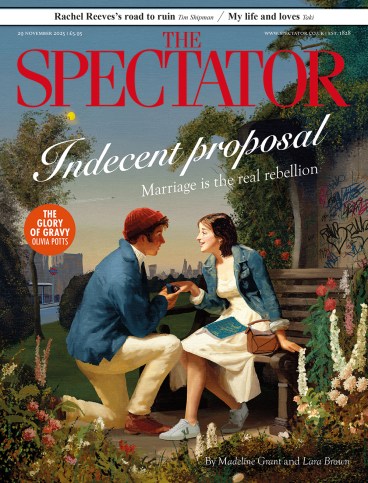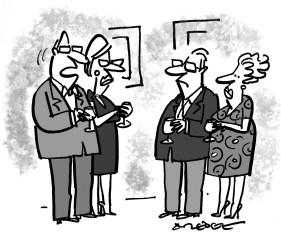
Readers tend not to approve of rows between columnists, but I must take issue with something Lloyd Evans wrote in ‘No life’ last week. Our theatre critic claimed that his companionship ‘is very low calibre’, that he ‘can’t match anyone in conversation’ and that he ‘can barely recall making a witty or worthwhile comment’ in his life. I should like to disagree.
Some time ago at a party in The Spectator’s garden I got talking with Lloyd and he said one of the most interesting things I’d heard in years. I had gone over to congratulate him on summing up the general awfulness of most of George Bernard Shaw’s plays in just a few paragraphs in a recent column, and then began commiserating with him. My sentiments went something along the lines of: how do you do it? How does anyone put up with having to go to places like the Royal Court Theatre almost every night to see so many appalling plays, and yet still report back fresh, weekly, from the front lines?
His reply was as pellucid as anything he has put on the page. ‘Most of the theatre isn’t really the theatre,’ he said. ‘Then what is it?’ I asked. ‘I think it thinks it’s a thinktank,’ was his reply.
That observation returns to me almost every time I see something new in London or on Broadway. And it returns to me whenever I see some appalling actor or actress publicly oppose some government policy or other. Not that they do that much when Labour is in power, obviously. But whenever they do make a stand, thanks to Lloyd, I think: ‘Of course. They must be so frustrated. They think that they are going to change the world – or even a government policy. And yet their means of trying to accomplish this is to appear nightly in some Caryl Churchill play, to a half-full house of well-off and bored theatre-goers.’
People often say things they think haven’t landed but which cause ripples for a long time to come
In fact Lloyd’s observation that evening has led me to compile in my head an ongoing list of other industries in our culture which are something other than the outsider imagines them to be. The publishing industry, for example. You might imagine that publishers want to publish books that will inform, entertain and instruct the general public – hopefully making a bit of cash along the way, and generally widening the borders of the republic of letters. Yet whenever I hear of some eruption of rage from non-binary junior staffers at a major publishing house, followed by the almost inevitable kowtowing by their seniors, I am reminded of the reality: that much of the publishing industry believes its job is to assert the boundaries of what should be permissible to say or do in the culture and then beat those boundaries mercilessly.
Again, as with the theatre industry, there must be an unbelievable amount of frustration and unhappiness in a life spent doing this. Because all the time some junior editor at a failing publishing house is trying to keep public opinion and knowledge restricted, an enterprising young Substacker is blowing the whole thing open anyway.
There are other, more obvious examples of the rule. The teaching unions. Most people who claim to be involved in the education industry. Parts of the National Health Service. Readers might like to make their own additions.
Anyhow, I say this not just to point out that Lloyd does not have an accurate view of himself, but also to point out that in my experience people quite often say things they think haven’t landed but which cause ripples and sparks in other people for a long time to come. One lesson I have learned in life is that we should be better at telling people when they have made a difference to us. Which is why I offer up this gentle rebuke to a columnist I admire.
Speaking of the world of letters, this week brought news of the death of the author and journalist David Pryce-Jones. David was literary editor of this magazine in the early 1960s, and an occasional contributor until his death aged 89. By any measure he led a remarkable life. The son of former Times Literary Supplement editor Alan Pryce-Jones, David’s mother’s side of the family were Austrian Jews, and so he spent his childhood fleeing the Nazis. The family left Austria for France when David was a baby. In 1940 he was woken by his nanny as the Nazis were advancing on Paris. He ended up being taken south and across the border into Spain, and spent the war years in North Africa.

Coming to England after the war, he had a both conventional and highly unconventional education and career – as readers of his memoir Fault Lines will know. In a long and remarkable life he not only delighted his friends and readers, he was also a moral lodestar. His fierce anti-Nazism was perhaps inevitable. His book Unity Mitford: A Quest brought him into conflict with the remaining apologists for that horror, including, on one occasion, a live television debate against Oswald Mosley, chaired by Melvyn Bragg.
But David’s anti-communism – and indeed his anti-Islamism – were just as strong. The variety of people his many worlds brought him into opposition, alliance or friendship with is demonstrated in his wonderful 2020 book Signatures, which takes readers on a tour of some of the books in his collection which authors had signed for him and describes the circumstances in which this happened. The list included Arthur Koestler, W.H. Auden and Albert Speer.
In person, as on the page, David was a figure of steely moral force and effortless delight. All his friends can attest that there was no one else you would rather spend an evening with. He was a friend but also a guide. After the editor and critic John Gross died, Martin Amis said in a eulogy that every-thing he wrote, he would still always in some sense pass by Gross’s desk. I feel the same about David, and always will.








Comments